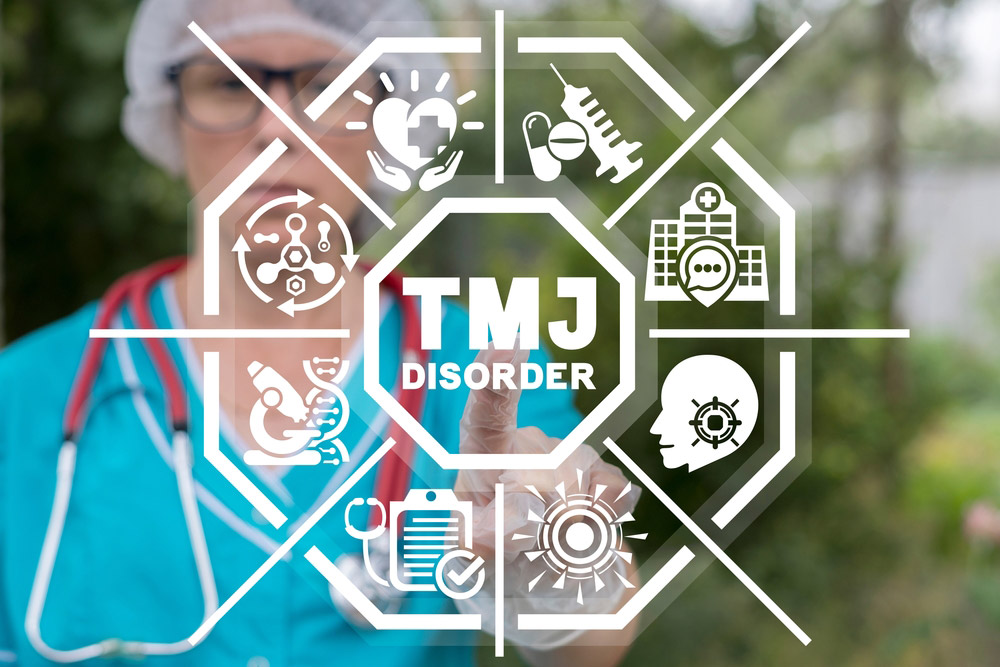The jaw is made of a complex system of bones, joints, and muscles that work together harmoniously – and when a problem persists in any of these parts, it can lead to temporomandibular joint disorders (TMJD).
To answer whether TMJ/D is a dental or medical problem is not as straightforward as it seems. This article aims to provide more information on how both medical and dental problems can cause TMJ/D pain and the treatments available.
What is TMJD?
The temporomandibular joints are the ball and socket joints that connect the upper and lower jaws to the temporal bones of the skull. They play a crucial role in our ability to move the jaw up and down, side to side, and back and forth. When a problem prevents these joints from working in harmony, it can lead to chronic pain, discomfort, and limitations in talking, eating, and yawning.
TMJD can be caused by inflammation due to misalignment or injury. The most common cause of TMJD is bite malocclusion (also known as a bad bite) because the jaw is held in an unnatural position, causing the jaw muscles to become strained.
TMJ/D as a dental or medical problem
Unfortunately, TMJ/D are often misdiagnosed and overlooked because their symptoms are similar to other health conditions. Dr. Alexandra S. George DDS specializes in this area of dentistry and the way we view and approach TMJ/D is much different than other dental offices. We view your dental health and overall health as a whole that is closely connected with each other.
Many diseases can negatively impact your oral health and dental problems can manifest as serious issues elsewhere in the body. As a result, TMJ/D can be both a dental or medical problem, depending on many factors such as your health history, what type of symptoms you may be experiencing, medications you’re taking, underlying health conditions, diagnosed health conditions, diet, smoking, and more.
How to know if you have TMJ
Some of the most common symptoms of TMJ include:
- Locking of the jaw joint
- Difficulty opening and closing the mouth
- Ear pain
- Neck pain
- Shoulder pain
- Difficulty chewing, talking and yawning
- Constant facial pain
However, these symptoms are also related to other conditions such as tension headaches, migraines, and chronic sinus pain. If you’re experiencing any of the above symptoms, see your dentist or family physician who can offer the right treatment.
TMJ/TMJD treatments
If you’re looking for relief from your TMJ/D symptoms, we focus on treating TMJ/D using a neuromuscular approach and advanced technology to find and treat the source of your pain.
- Orthotic Appliance – Orthotics move the lower jaw to its proper neuromuscular position to help reduce TMJ/D symptoms. They are removable and can be worn up to 24 hours a day.
- Crowns – By restoring teeth to a pain-free position, crowns can reduce painful and uncomfortable TMJ/D symptoms. Crowns restore lost tooth structure and worn teeth, making them ideal for patients who grind their teeth.
- Braces – Braces for TMJ/D focuses on how your teeth and jaw function, but will also give you a beautiful straight smile in the process. With braces, we are able to move the teeth and shift the jaw structure to a more comfortable and permanent position.
- DTR Therapy – Disclusion Time Reduction (DTR) Therapy uses advanced Tekscan and EMG technology to provide accurate measurements of a patient’s bite. With this data, we can identify where the teeth come together that cause hyperactive muscles, breakage, and TMJ/D symptoms to make accurate micro-adjustments to the tooth. The result is a better, more functional bite.
Finding the right TMJ/D treatment
The right TMJ/D treatment for you will depend on many factors. Dr. Alexandra S. George DDS looks at all mechanical functions of the mouth and jaw along with tissues and structures to determine whether they are healthy and working correctly.
A complete dentistry approach to TMJ/D looks at how treating one part of the mouth can impact the rest of the mouth. The right TMJ/D treatment minimizes impact and stress on the TMJ and muscles of the jaw.


